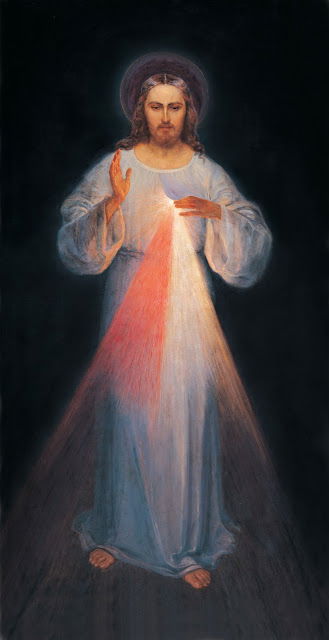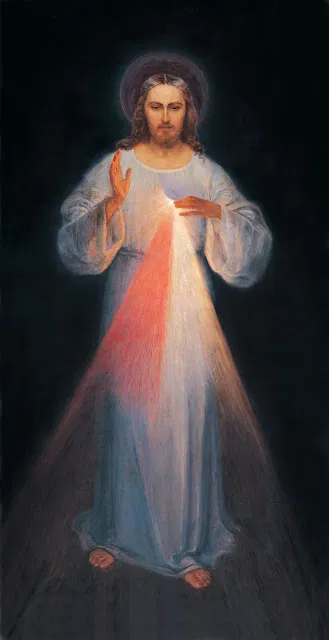Festa da Divina Misericórdia: uma comporta aberta de graças divinas

Our Lord opens a floodgate of mercy on the first Sunday after Easter. In apparition to Saint Faustina, He asked her to propagate this day as the Feast of Divine Mercy, in which the Image (the same one posted) that He described it to be painted should be venerated. Jesus then said:
"I offer men a vessel, with which they must come and seek graces at the source of mercy. The vessel is the Image with the inscription: "Jesus, I trust in You" (Diary, 327)
Jesus said in another apparition to Saint Faustina:
"I want there to be a Feast of Mercy. I want this Image, which you will paint with a brush, to be solemnly blessed on the first Sunday after Easter, and that Sunday should be the Feast of Mercy" (Diary, 49)
Jesus explains to Saint Faustina how to obtain the remission of guilt and penalties arising from sins on this day:
“I want the Feast of Mercy to be a refuge and shelter for all souls, especially for poor sinners. (…) On this day the entrails of My Mercy are open. I pour out a whole sea of graces on those souls who approach the source of My Mercy. The soul that goes to confession and receives Holy Communion will obtain total remission of faults and penalties . On that day, all the divine floodgates are open, through which graces are poured. Let no soul fear to come to Me, though her sins be as bright as scarlet.” (Diary, 699)
Pope John Paul II made official a decree establishing plenary indulgences (READ HERE THE DECREE) to enrich the Sunday of the Feast of Mercy even more. To gain plenary (or partial) indulgences, one must comply with the following terms approved in the decree:
A Plenary Indulgence is granted under the usual conditions (sacramental Confession, Eucharistic Communion and prayers according to the intention of the Supreme Pontiff ) to the faithful who, on the second Sunday of Easter, that is, of "Divine Mercy", in any church or oratory, with the spirit completely detached from affection for any sin, even venial, participate in piety practices in honor of the Divine Mercy, or at least recite, in the presence of the Blessed Sacrament of the Eucharist, publicly exposed or kept in the Tabernacle, the Our Father and the Creed , together with a pious invocation to the Merciful Lord Jesus (eg, "O Merciful Jesus, I trust in You") . A partial indulgence is granted to the faithful who, at least with a contrite heart, raise to the Merciful Lord Jesus one of the legitimately approved pious invocations.

Source: Creative Commons
Jesus also explains to Saint Faustina about the Hour of Mercy (3 pm):
At three in the afternoon, implore my mercy especially for sinners and at least for a brief moment, reflect on My Passion, especially on the abandonment in which I found myself in the moment of agony. This is the hour of mercy for the whole world. I will allow you to penetrate My mortal sadness. At that time I will deny nothing to the soul that asks Me for My Passion... (Diary, 1320)
Don't fail to take advantage of these immense graces that God has given us for this merciful day!
References: DIÁRIO DE SANTA FAUSTINA, CANÇÃO NOVA, VATICANO - A SANTA SÉ, CHRISTO NIHIL PRAEPONERE